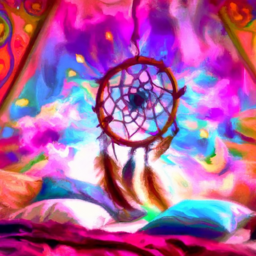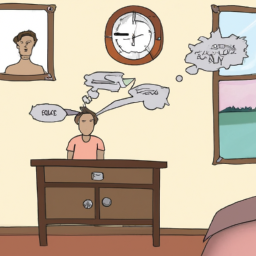Every night, I find myself immersed in vivid dreams that exhaust me by morning. It’s as if I’m living a separate life while I sleep, where anything is possible and emotions are magnified. While thrilling, this experience can also be overwhelming and taxing.
I can’t help but wonder why this is happening to me and what I can do to make it stop. It turns out I’m not alone. Many people experience vivid dreams on a nightly basis, but the reasons behind them can vary. From lifestyle habits to underlying medical conditions, there are a multitude of factors that can cause these vivid and sometimes bizarre dreams.
In this article, I’ll explore some common causes of vivid dreams and offer advice on how to alleviate them so that you can get a restful night’s sleep.
Key Takeaways
- Vivid dreams can be caused by lifestyle habits or underlying medical conditions, stress, anxiety, or depression, and an irregular sleep schedule.
- To reduce vivid dreams, one can maintain a consistent sleep schedule, use relaxation techniques, exercise regularly, consume foods high in tryptophan or vitamin B6, and avoid alcohol and caffeine.
- Seeking professional help is recommended if lifestyle changes do not work, and one can consult with a sleep specialist for underlying medical issues or talk to a therapist or counselor for psychological issues.
- Therapy can provide personalized solutions, coping mechanisms, relaxation techniques, and stress-reducing exercises, which can improve overall quality of life, manage emotions and thoughts, and create a safe and supportive environment. Vivid dreams can impact daily life and reduce sleep quality.
Understanding the Common Causes of Vivid Dreams
You’re probably having vivid dreams every night because your mind is processing a lot of information and emotions from the day, causing your brain to work overtime during REM sleep. This can happen if you’re going through a period of stress, anxiety, or depression, or if you’re experiencing a major life change, such as a new job, a move, or a breakup.
Your brain is trying to make sense of all the new and overwhelming information, and it does this by creating vivid and sometimes disturbing dreams.
Another common cause of vivid dreams is an irregular sleep schedule. If you’re staying up late or waking up at different times every day, your body may not be getting enough REM sleep, which can lead to more intense and memorable dreams.
To prevent this, it’s important to maintain a consistent sleep schedule, even on weekends or days off. This can help regulate your circadian rhythm and ensure that you’re getting enough REM sleep to feel rested and replenished each morning.
Maintaining a Consistent Sleep Schedule
By consistently going to bed and waking up at the same time every day, I’ve noticed a significant decrease in the intensity and frequency of my vivid dreams. This is because establishing a natural sleep-wake cycle helps regulate the body’s internal clock and reduces the likelihood of disruptions during the night.
In turn, this promotes a more restful and peaceful sleep, which can lead to a decrease in vivid dreaming. In addition to maintaining a consistent sleep schedule, I’ve also found that incorporating relaxation techniques into my bedtime routine has been helpful in reducing the occurrence of vivid dreams.
By practicing relaxation techniques such as deep breathing, meditation, or yoga before bed, I’m able to calm my mind and prepare my body for a restful sleep. This allows me to enter a state of relaxation and ease, which can help reduce the likelihood of intense and vivid dreams throughout the night.
Incorporating Relaxation Techniques
To incorporate relaxation techniques into my bedtime routine, I try taking a warm bath or shower to soothe my muscles and clear my mind before climbing into bed. This can help me unwind and let go of any stress or tension from the day.
I also like to practice deep breathing exercises or gentle yoga stretches to further relax my body and mind.
In addition to these techniques, I’m making lifestyle changes to improve my sleep quality. This includes limiting screen time before bed, avoiding caffeine and alcohol in the evening, and creating a comfortable sleep environment.
By incorporating relaxation techniques and making these changes, I’m hopeful that my vivid dreams will become less frequent and I’ll wake up feeling more rested and refreshed.
Making Lifestyle Changes
I’ve found that making lifestyle changes has greatly improved the quality of my sleep and reduced the frequency of vivid dreams.
Exercise has helped me release any pent-up energy and stress that could be contributing to my vivid dreams.
I’ve also made a conscious effort to improve my diet by incorporating more fruits and vegetables and avoiding processed foods.
Lastly, I’ve reduced my intake of alcohol and caffeine, which can disrupt sleep patterns and lead to more vivid dreams.
Exercise
Hey, lazy bones, if you’re wondering why you’re having such vivid dreams every night, maybe it’s time to get off your butt and hit the gym. Exercise has been shown to improve sleep quality and reduce stress, both of which can contribute to more vivid and memorable dreams. Plus, it releases endorphins that can boost your mood and overall well-being.
Here are some benefits to exercise that can lead to better sleep and less vivid dreams:
- Exercise reduces anxiety and stress, which can lead to more peaceful sleep.
- Exercise tires the body out, making it easier to fall and stay asleep.
- Exercise can increase REM sleep, which is when the most vivid dreams occur.
If hitting the gym isn’t your thing, try going for a walk or doing some yoga. Anything that gets your body moving and your heart rate up can have a positive impact on your sleep and dream quality.
Now, let’s talk about how your diet may be affecting your dreams.
Diet
Improving your diet can have a significant impact on the quality and content of your dreams. Consuming foods that are high in tryptophan, such as turkey, chicken, eggs, and cheese, can increase the levels of serotonin in your brain, which can promote more restful sleep and improve your dreams.
Additionally, incorporating foods that are rich in vitamin B6, such as bananas, nuts, and seeds, can also enhance the production of serotonin and help you achieve more vivid dreams.
In addition to improving your diet, avoiding alcohol and caffeine can also have a positive effect on your dream experience. These substances can disrupt your sleep patterns and affect the content of your dreams, leading to less vivid and less memorable dreams.
By limiting your intake of alcohol and caffeine, you can increase the likelihood of having more vivid and meaningful dreams each night.
Avoiding Alcohol and Caffeine
If you want to experience more vivid dreams every night, it’s important to avoid consuming alcohol and caffeine before bedtime. While these substances may help you feel more relaxed or awake in the moment, they can actually disrupt your sleep patterns and affect the content of your dreams.
This can lead to less memorable or meaningful experiences while you sleep. Remember, less is more when it comes to consuming these substances. Try cutting back on your intake and see if you notice a difference in the quality of your dreams.
If you still find yourself struggling to achieve restful sleep and vivid dreams, it may be time to seek professional help. A sleep specialist or therapist can help you identify any underlying issues that may be interfering with your sleep and provide guidance on how to address them. Don’t be afraid to reach out for support if you need it.
Seeking Professional Help if Necessary
If I’ve tried making lifestyle changes but I’m still having vivid dreams every night, it may be time to seek professional help.
Consulting with a sleep specialist can help determine if there are any underlying medical issues causing the vivid dreams. Additionally, therapy or counseling can be helpful in addressing any underlying psychological issues that may be contributing to the vivid dreams.
Make sure to seek professional help if necessary.
Consulting with a Sleep Specialist
Consulting with a sleep specialist can help determine if there are underlying medical issues contributing to your vivid dreams every night. Some possible reasons for these dreams could be sleep apnea, restless leg syndrome, or certain medications. By working with a specialist, you can better understand what’s happening in your body while you sleep and take steps to address any underlying issues causing your vivid dreams.
Here are five benefits of consulting with a sleep specialist:
- You can receive a proper diagnosis for any sleep disorders that may be contributing to your vivid dreams.
- A specialist can provide you with personalized treatment options.
- You can learn about lifestyle changes that may improve the quality of your sleep.
- A sleep specialist can help you understand the impact of certain medications on your sleep.
- You can receive ongoing support and guidance as you work to improve your sleep.
With the help of a sleep specialist, you can start to address any underlying medical issues that may be contributing to your vivid dreams. Additionally, it may be helpful to explore therapy or counseling for underlying psychological issues that may be impacting your sleep.
Therapy or Counseling for Underlying Psychological Issues
Take a deeper look into your thoughts and emotions with the help of therapy or counseling, as they can help uncover any underlying psychological issues that may be affecting your sleep. This is similar to how a gardener can help identify and address the root cause of a plant’s wilting.
Vivid dreams can be a sign of stress, anxiety, or even unresolved trauma. By talking to a therapist or counselor, you can address these issues and work towards a more peaceful and restful sleep.
Therapy can also provide you with tools and techniques to manage your thoughts and emotions, which can improve your overall mental health and well-being. You can learn coping mechanisms, relaxation techniques, and stress-reducing exercises that can not only improve your sleep but also enhance your quality of life.
So, if you’re experiencing vivid dreams every night, don’t hesitate to seek professional help and take the first step towards a better night’s sleep.
Frequently Asked Questions
Can certain medications or supplements cause vivid dreams?
Yes, certain medications and supplements can cause vivid dreams. Antidepressants, nicotine patches, and vitamin B6 are known to increase dream intensity. It’s important to talk to a healthcare provider if you’re experiencing persistent vivid dreams.
Is there a way to control or manipulate the content of vivid dreams?
On average, a person spends 6 years of their life dreaming. I find it fascinating that we can control and manipulate our dreams through lucid dreaming techniques. With practice, I have been able to shape the content of my vivid dreams.
Are there any natural remedies or supplements that can reduce vivid dreams?
I’ve found that taking magnesium supplements before bed can reduce the intensity of my dreams. Chamomile tea and lavender oil have also helped me relax before sleep and lead to less vivid dreams.
Can vivid dreams be a symptom of a more serious underlying condition?
Vivid dreams can be a symptom of various underlying conditions, such as sleep disorders, anxiety, depression, or even neurological disorders. It’s best to consult a healthcare professional to determine the cause and appropriate treatment.
Do certain foods or drinks before bedtime affect the likelihood of having vivid dreams?
Certain foods and drinks consumed before bedtime can increase the likelihood of having vivid dreams. Spicy or fatty foods, caffeine, and alcohol are common triggers. Avoiding these before sleep may lead to less intense dreams.
Conclusion
So, you’ve been having vivid dreams every night. Don’t worry, it’s not uncommon and can be caused by a number of factors. From stress to medication, there are many things that can trigger these intense and often unsettling dreams.
But there are ways to reduce the frequency and intensity of these dreams. By making a few simple lifestyle changes, like maintaining a consistent sleep schedule and incorporating relaxation techniques, you can help alleviate the problem.
I remember one particularly vivid dream I had about being lost in a forest. I felt completely alone and hopeless, until I stumbled upon a small clearing filled with sunlight and the sweet smell of wildflowers. It was a small moment of peace and beauty in an otherwise chaotic dream.
Just like in that dream, we can find moments of light and hope even in the midst of difficult situations. We just have to keep looking for them.









